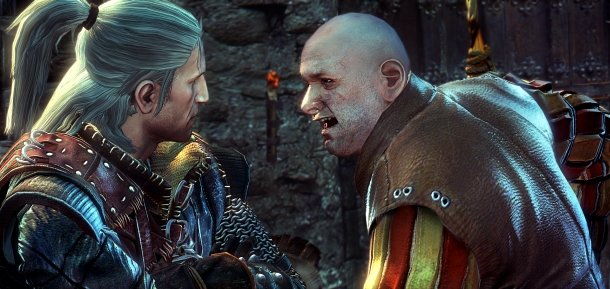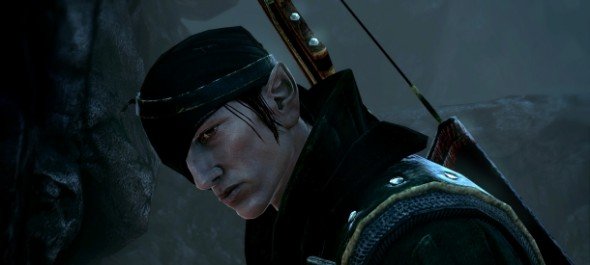The Witcher 2 devs claim 100% accuracy in identifying pirates, demand money from thousands

CD Projekt RED have sent legal notices demanding money from thousands of alleged pirates in Germany, with a threat of court action for anyone refusing to pay.
When The Witcher 2 was released earlier this year, its developers CD Projekt RED offered the game DRM-free via sister-company GOG.com. It was a smart move, and including retail copies with DRM included, The Witcher 2 sold over a million copies worldwide. When the DRM free version was announced, the other part of the story was that CDP RED would monitor torrent sites and pursue the pirates. TorrentFreak reported that they're now doing exactly that, using the same deeply unpopular tactic used in the past by music companies and games publishers.
We spoke to CD Projekt RED to find out why they've decided to pursue pirates in this way, and why they think they've found a way to successfully identify pirates with 100% accuracy and "are not worried about tracking the wrong people."
This method of pursuing alleged pirates became famous in 2008 after British law firm Davenport Lyons used the tactic on behalf of a number of clients, including Atari, the North American publishers of The Witcher 2. The problem is that the practice traditionally relies on an alleged pirates IP address, which are a poor way to track an individual person due to being dynamic, easily masked, and easily shared amongst multiple people over unsecured wifi, shared houses or public spaces.
CDP RED feel they've found a way, using a method developed by an external company.
"We're addressing only 100% confirmed piracy causes that are 100% possible to prove," said Michal Nowakowski, VP of Business Development for CD Project RED, via email. He wouldn't be drawn on the methods used, however. "We are not worried about tracking the wrong people. As this is the trade secret of the company working on this, I cannot share it. However, we investigated the subject before we decided on this move, and we aware of some past complications (the famous Davenport case). The method used here is targeting only 100% confirmed piracy cases. No innocent person was targeted with the letter so far. At least we have not received any information as of now which would indicate something like that."
When asked, CDP RED also refused to name the company whose services they were using, for fear of damaging that company's business. Which is deeply odd, as identification for doing your job isn't normally damaging. But he also claimed CDP RED weren't the only people using these methods. "For some reason the spotlight came down on CDP RED, however you should be aware this is something that about 95% of the games industry is actually doing. Pretty much all the major publishers and most of the independent developers."
The biggest gaming news, reviews and hardware deals
Keep up to date with the most important stories and the best deals, as picked by the PC Gamer team.

Speaking to us last month, CDP's CEO told PC Gamer that "None of [the] solutions really work, so why not abandon it altogether?" He also estimated piracy of over 4 million copies.
When asked how many people had agreed to pay the compensation, Michal couldn't give exact numbers, but said that no case had gone to court so far. "As far as I know the vast majority of people identified decided to admit to piracy and pay the compensation as a means of settlement." He also had hopes that the move could lower piracy rates in future. "I do believe this may work as a deterrent to future pirates, especially the most notorious ones. I would personally hope these people would be more convinced by our pro-customer policy, but if they are of the unchangeable kind that never bought and never will buy a legal game, I would at least hope they do not trespass on our title. Do I believe this will stop the piracy? That's impossible, and never will be. But maybe it will be smaller."
Michal was keen to stress that CDP RED still believed that releasing games DRM-free was the way to go. "We trust in our customers and I really do feel they repaid us in a great way by buying and supporting us, for which we are more than grateful." Still, they felt pursuing pirates was necessary. "There is always a group of people, who no matter what is their financial situation will choose to download the software, just because they can," said Michal.
"In terms of the compensation, the amounts that were circling around the internet were higher than what is actually asked from people as a settlement." The actual number requested is private as part of the settlement's confidentiality, but Michal wanted to make clear that no one was getting rich from the pirates.
When Davenport Lyons took this same action in 2008, they accused innocent people of piracy by sending frightening letters. I'm extremely sceptical of any supposed new method to track alleged pirates with 100% accuracy, and without knowing more about those methods or even the name of the company that developed them, it's hard to know where to stand on CDP RED now doing the same thing. Demanding money from people under threat of court action also feels deeply uncomfortable, whatever the accuracy of technology.
Do you think it's justified, if only pirates are targeted and it means legitimate customers no longer need to put up with DRM?

